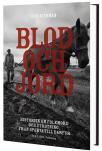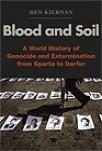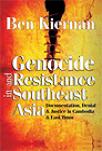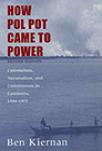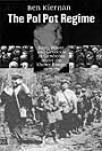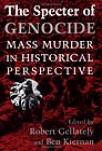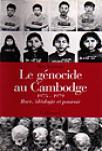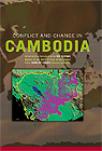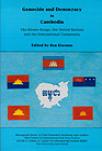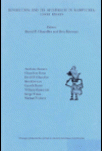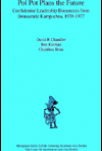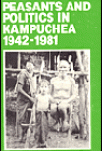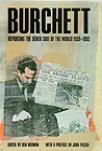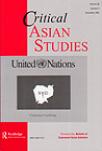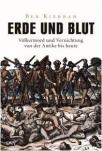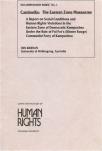His book Việt Nam: A History from Earliest Times to the Present (2017) was selected for “Review of the Month” in the Australian Book Review in June-July of 2017. Foreign Affairs described the book as “pathbreaking not only in its chronological scope (from prehistory to the present) and the breadth of its sources but also in its thematic reach.” London’s Times Literary Supplement called it “excellent… Kiernan’s dispassionate recording of the behaviour of the regional powers – Champa, Cambodia, China, India – should help to make Viet Nam: A history from earliest times a durable work” (March 7, 2018). Australia’s Asian Studies Review (Sept. 2018) found the book “comprehensive yet readable” and predicted that it “is certain to become a classic in Vietnamese studies.” Reviewer Michael Vann added: “Kiernan’s repeated discussion of Vietnamese history’s relationship to water is perhaps his most original contribution… He is a gifted writer and his prose is engaging.” In the U.S. Journal of Asian Studies (Feb. 2019), C. Michele Thompson cited the book’s “clear, well-written overview of the major individuals, families, social groups, institutions, and states of the north,” while noting that “information on the ‘other’ peoples of Vietnam—their political entities, their relations with the dynasties of the north, and elements of their culture and religion that became incorporated into mainstream Việt culture—is presented in every single chapter … This is the most unusual and the most original contribution of this book.”
Kiernan is also the author of How Pol Pot Came to Power: Colonialism, Nationalism, and Communism in Cambodia, 1930-1975 (1985, 2004), which was Asiaweek “Editor’s Pick of the Month”; Cambodia: The Eastern Zone Massacres (1986); The Pol Pot Regime: Race, Power and Genocide in Cambodia under the Khmer Rouge, 1975-1979 (1996, 2002, 2008), which is listed among The 100 Greatest Southeast Asian History and Politics Books (ListMuse); Le Génocide au Cambodge, 1975-1979: Race, idéologie, et pouvoir (1998); and Genocide and Resistance in Southeast Asia: Documentation, Denial and Justice in Cambodia and East Timor (2007). He is the co-author of Khmers Rouges ! Matériaux pour l’histoire du communisme au Cambodge (1981), Peasants and Politics in Kampuchea, 1942-1981 (1982), and Cambodge: Histoire et enjeux (1986), and has published numerous articles on Southeast Asia and the history of genocide. He is a member of the editorial boards of Critical Asian Studies, and of Acta Asiatica Varsoviensia (Institute of Mediterranean and Oriental Cultures, Polish Academy of Sciences). He is also a member of the International Council of the Institute on the Holocaust and Genocide in Jerusalem.
Kiernan’s book The Pol Pot Regime: Race, Power, and Genocide in Cambodia under the Khmer Rouge, 1975-1979 (Yale University Press, 1996) won praise from reviewers in the UK, the USA, and Europe. The Economist magazine called it “meticulous… This is not the first account of Pol Pot’s terror… But Mr. Kiernan’s is perhaps the most complete and the closest to Cambodian sources” (May 18, 1996). Former New York Times reporter Sydney Schanberg wrote in The Nation: “While legions of Western scholars have devoted themselves to the Holocaust perpetrated by Nazi Germany, very few have made it their mission to look into the depths of the genocides that occur in little countries, far away in the Third World. Ben Kiernan has done this for Cambodia” (April 8, 1996). In History magazine, Jeffrey M. Chwieroth wrote that “Kiernan continues to lead scholarly research on that country” (Summer 1996).
In the UK Sunday Telegraph, Christopher Andrew called The Pol Pot Regime “generally authoritative …impressively researched and deeply disturbing” (April 28, 1996). Justin Wintle wrote: “Painstaking scholarship aside, Kiernan’s real contribution to understanding the Khmer Rouge is his exploration of what befell Cambodia’s minorities” (New Statesman and Society, May 3). In the Daily Telegraph, John Colvin called the book “an excellently comprehensive account” (May 4). The Scotsman’s Colin Donald wrote: “Kiernan’s massively authoritative and dispassionate study quickly establishes itself as the most thorough and comprehensive work on Cambodia’s four years of living death” (May 4).
Simon Scott Plummer, reviewing the book for The Tablet, called it “an invaluable record of the workings of a political phenomenon of our century” (June 15). Victor Mallet noted in the Financial Times that Kiernan had interviewed “500 Cambodians… for this detailed study of the Khmer Rouge revolution” (August 3). In the London Review of Books, Tom Nairn termed the work “Definitive… [d]rawing on a much wider range of interviews and documents than previous scholars” (October 3). Richard Gough, in the Times Higher Education Supplement, found it “authoritative” (October 4).
In Italy, Il Giornale found The Pol Pot Regime “impressive” (June 7, 1996). Germany’s Frankfurter Allgemeine Zeitung described it as “The most comprehensive and thorough presentation of the rise, development and fall of the Pol Pot regime… Kiernan’s book is the study” (August 24, 1996). The Asia Europe Journal found it “generally considered a classic” (September 2007). In the Asia-Pacific Magazine, Kelvin Rowley, co-author of Red Brotherhood at War, wrote: “No other writer has listened to so many Cambodians describe what they did, and what was done to them, in those four years. Everyone who wants to understand what actually happened under the Pol Pot regime must read Kiernan’s exhaustive, absorbing, and thoroughly depressing account” (April 1996).
Kiernan was founding Director of the Cambodian Genocide Program (1994-99; 2001-present) and Convenor of the Yale East Timor Project (2000-02). Kiernan’s edited collection Conflict and Change in Cambodia, which won the 2002 Critical Asian Studies Prize, was republished as a book in 2006. He is also the editor of Genocide and Democracy in Cambodia: The Khmer Rouge, the United Nations, and the International Community (1993), and Burchett: Reporting the Other Side of the World, 1939-1983 (1986), and co-editor of Political Violence in Southeast Asia since 1945: Case Studies from Six Countries (2021), Revolution and Its Aftermath in Kampuchea (1983), Pol Pot Plans the Future: Confidential Leadership Documents from Democratic Kampuchea, 1976-1977 (1988), and The Specter of Genocide: Mass Murder in Historical Perspective (2003).
In 1979, Kiernan completed his first paper on the subject of the Cambodian genocide, “Pol Pot and Kampuchea’s Eastern Zone: A Final Solution ?,” published in the Netherlands in 1980 as “Genocide in the Eastern Zone” (“Genocide in de Oostelijke Zone,” Vietnam Bulletin No. 16, June 25, 1980, pp. 20-22). During the 1980s he wrote further studies of Khmer Rouge crimes in Cambodia, including “Bureaucracy of Death: Documents from Inside Pol Pot’s Torture Machine,” New Statesman (London), May 2, 1980, pp. 669-676 (with C. Boua and A. Barnett); “Wild Chickens, Farm Chickens, and Cormorants: Kampuchea’s Eastern Zone under Pol Pot,” in Revolution and Its Aftermath in Kampuchea, New Haven, 1983, pp. 136-211; “Kampuchea’s Ethnic Chinese Under Pol Pot: A Case of Systematic Social Discrimination,” Journal of Contemporary Asia 16:1, 1986, pp. 18-29; “Orphans of Genocide: The Cham Muslims of Kampuchea under Pol Pot,” Bulletin of Concerned Asian Scholars 20:4, 1988, pp. 2-33; “The Genocide in Cambodia, 1975-1979,” Bulletin of Concerned Asian Scholars 22:2, 1990, pp. 35-40; “Cambodian Genocide,” Far Eastern Economic Review, 1 March 1990, pp. 18-19; and “Genocidal Targeting: Two Groups of Victims in Pol Pot’s Cambodia,” in State Organized Terror: The Case of Violent Internal Repression, ed. P. T. Bushnell, et al., Boulder, Westview, 1991, pp. 207-226.
The
2009 UN Demographic Expert Report to the Extraordinary Chambers in the Courts of Cambodia, on the death toll under the Khmer Rouge regime, which was prepared by the chief demographer in the Office of the Prosecutor at the United Nations International Criminal Tribunal for the former Yugoslavia in The Hague, described Kiernan’s estimates of excess deaths in the Khmer Rouge period as “methodologically sound and transparent,” and concurred with his estimates of both the minimum national-level death toll under the Khmer Rouge regime and the specific tolls among Cambodia’s minority Cham Muslims, ethnic Chinese, Thai, Lao, and Vietnamese.
In 1990 Kiernan moved to Yale University from the University of Wollongong, Australia. As director of the Cambodian Genocide Program (CGP), Prof. Kiernan received approximately $2 million in grants to document the crimes of the Pol Pot regime, to establish the Documentation Center of Cambodia in Phnom Penh, and to recruit, fund, equip and train its Cambodian staff. Under his direction the CGP’s extensive multilingual website won multiple internet awards. Prof. Kiernan has also received numerous other grants, honors, and fellowships, including a Harry Frank Guggenheim Foundation Research Award; a Professorial Fellowship at the University of Melbourne; the Australian Research Council’s national Federation Fellowship; the Horace W. Goldsmith Fellowship at the National Humanities Center; the Inaugural S.T. Lee Visiting Fellowship, University of Sydney; Camargo Foundation Fellowships in Cassis, France; Visiting Fellowships at the Long Room Hub, Trinity College Dublin; the Jan Randa Visiting Fellowship at the Australian Centre for Jewish Civilisation, Monash University; an American Council of Learned Societies Fellowship; a Rockefeller Foundation Bellagio Fellowship; a Bogliasco Foundation Fellowship at the Liguria Study Center for the Arts and Humanities; a Fellowship at the Davis Center for Historical Studies, Princeton University; and the 2015 Distinguished Alumni Award from the Faculty of Arts, Monash University, Australia.
He has been elected a Member of the Council of the Asian Studies Association of Australia (1988-90), of the Southeast Asia Council of the U.S. Association for Asian Studies (1993-96), and of the Advisory Council of the International Association of Genocide Scholars (2007-09).
His undergraduate courses included: Southeast Asia from Earliest Times to 1900, Southeast Asia since 1900, Vietnamese History from Earliest Times, The Vietnam War, Environmental History of Southeast Asia, and graduate seminars on the Vietnam War and on various aspects of the history of genocide.
Yale University Retirement Tribute to Prof. Kiernan (2022)
![]()
![]()
![]()
![]()
![]()
![]()
![]()
![]()
![]()
![]()
![]()
![]()
![]()
![]()
![]()
![]()
![]()
![]()
![]()
![]()
![]()
Yale PhD dissertations directed by Ben Kiernan:
Ewing, Cindy. The Asian Unity Project: Human Rights, Third World Solidarity, and the United Nations, 1945-1955 (2018). Co-Winner of the Arthur and Mary Wright Prize for the best doctoral dissertation in non-Western History. Shortlisted for the 2019 International Convention of Asia Scholars Prize for the Best Humanities Dissertation. Winner of the International Studies Association’s Human Rights dissertation award for 2019.
Zakaria, Faizah. Sacral Ecologies of the North Sumatran Highlands: An Environmental History of Conversions, c.1800 to 1928 (2017). Co-Winner of the Arthur and Mary Wright Prize for the best doctoral dissertation in non-Western History. Shortlisted for the 2019 International Convention of Asia Scholars Prize for the Best Humanities Dissertation.
CuUnjieng, Nicole. Constructing Political Place: The International Philippine Revolution and Transnational Pan-Asianism, 1887-1912 (2016). She has published a revised version: Nicole CuUnjieng Aboitiz, Asian Place, Filipino Nation: A Global Intellectual History of the Philippine Revolution, 1887-1912 (New York, Columbia University Press, 2020).
Ko, Kevin. Modern Bodies, Modern Souls: Religion, Medicine, and the Public Imagination in Late Colonial Indonesia (2016)
Lowey-Ball, ShawnaKim. Liquid Market, Solid State: The Rise and Demise of the Great Global Emporium at Malacca, 1400-1650 (2015). Winner of both the Arthur and Mary Wright Prize for the best doctoral dissertation in non-Western History, and the John Addison Porter Prize, open to all Yale students, for the best written work of scholarship in any field in which it is possible, through original effort, to gather and relate facts and/or principles and to make the product of general human interest.
Dhont, Frank. Outlasting Colonialism: Socio-political Change in the Javanese Principalities under the Japanese Occupation of Indonesia during World War II (2012)
Fogg, Kevin William. The Fate of Muslim Nationalism in Independent Indonesia (2012). Fogg has published a revised and updated version: Kevin W. Fogg, Indonesia’s Islamic Revolution, Cambridge: Cambridge University Press, 2020.
Ford, Eugene Brassel. Cold War Monks: An International History of Buddhism, Politics, and Regionalism in Thailand and Southeast Asia, 1940-1975 (2012). Co-Winner of the Arthur and Mary Wright Prize for the best doctoral dissertation in non-Western History.
Ford has published a revised and updated version, Cold War Monks: Buddhism and America’s Secret Strategy in Southeast Asia (New Haven, Yale University Press, 2017). This book was shortlisted for the 2019 International Convention of Asia Scholars Prize for the Best Book in the Social Sciences.
Cherry, Haydon Leslie. Down and Out in Saigon: A Social History of the Poor in a Colonial City, 1860-1940 (2011). Co-Winner of the Arthur and Mary Wright Prize for the best doctoral dissertation in non-Western History.
Madley, Benjamin Logan. American Genocide: The California Indian Catastrophe, 1846-1873 (2009, co-directed with John Mack Faragher). Winner of the Frederick W. Beinecke Prize for an outstanding doctoral dissertation in the field of Western American history, and the 2010 Phi Alpha Theta-Westerners International Prize for the best 2009 dissertation in Western history. Madley has published a multi-award-winning revised and updated version, An American Genocide: The United States and the California Indian Catastrophe, 1846-1873 (Yale University Press, 2016).
Keith, Charles Patrick. Catholic Vietnam: Church, Colonialism and Revolution, 1887-1945 (2008, co-directed with John Merriman). Charles Keith’s 2012 book, Catholic Vietnam: A Church from Empire to Nation, won the 2015 Harry J. Benda Prize for “outstanding contributions to the field of knowledge about Southeast Asia,” awarded by the Southeast Asia Council of the U.S. Association for Asian Studies.
Paterson, Lorraine Marion. Tenacious Texts: Vietnam, China, and Radical Cultural Intersections, 1890-1930 (2006, co-directed with Jonathan D. Spence)
Wheeler, Charles. Cross-cultural Trade and Trans-regional Networks in the Port of Hoi An: Maritime Vietnam in the Early Modern Era (2001)
Tagliocozzo, Eric. Secret Trades of the Straits: Smuggling and State-Formation along a Southeast Asian Frontier, 1870-1910 (1999). Eric Tagliacozzo’s 2005 book, Secret Trades, Porous Borders: Smuggling and States along a Southeast Asian Frontier, 1865-1915, won the 2007 Harry J. Benda Prize for “outstanding contributions to the field of knowledge about Southeast Asia,” awarded by the Southeast Asia Council of the U.S. Association for Asian Studies.
Fineman, Daniel Mark. The United States and Military Government in Thailand, 1947-1958 (1993). Daniel Fineman’s book, A Special Relationship: The United States and Military Government in Thailand, 1947-1958, was published by the University of Hawai’i Press (Honolulu, 1997).
Member of other Yale PhD Dissertation Committees:
Kwok, William
The Banality of Organization: Mass Killings as a Coordination Problem in the Shadow of War (2023, Political Science)
Ngoc Tram Luong
The Optics of Hatred: Visualizing the Vietnamese Other in Cambodia (2022, Anthropology)
Kiechel, Charlotte Anne
The Politics of Comparison: Holocaust Memory, the European Left, and Third World Suffering, 1954-1980 (2022, History)
Vong, Sam C.
Compassion Politics: The History of Indochinese Refugees and the Transnational Networks of Care, 1975-1994 (2013, History)
Padwe, Jonathan
Garden Variety Histories: Social and Environmental Change in Northeast Cambodia (2011, Anthropology and the School of Forestry and Environmental Studies)
Cameron, Sarah Isabel
The Hungry Steppe: Soviet Kazakhstan and the Kazakh Famine 1921-1934 (2010, History)
Nguyen, Lien-Hang
‘Between the Storms’: North Vietnam’s Strategy during the Second Indochina War (1955-1973) (2008, History)
Jensen, Mette Bastholm
Solidarity in Action: A Comparative Study of Rescue Efforts in Nazi-occupied Denmark and the Netherlands (2007, Sociology)
Mironko, Charles K.
Social and Political Mechanisms of Mass Murder: An Analysis of Perpetrators of the Rwandan Genocide (2004, Anthropology)
Besirevic-Regan, Jasmina
Ethnic Cleansing in Banja Luka: National Homogenization, Political Repression, and the Emergence of a Bosnian Muslim Refugee Community (2004, Sociology)
Cagaptay, Soner
Crafting the Turkish Nation: Kemalism and Turkish Nationalism in the 1930s (2003, History)
Breckon, Lydia
The other side: Ethnic and transnational identity among Khmer-Americans in southern New England (1999, Anthropology)
Ninh, Kim Ngoc Bao
Revolution, Politics and Culture in Socialist Vietnam, 1945-1965 (1996, Political Science)
 A. Whitney Griswold Professor Emeritus of History; Founding Director of the Cambodian Genocide Program and the Genocide Studies Program, MacMillan Center (1994-2015); Professor of International & Area Studies, MacMillan Center (2005-2021); Chair, Council on Southeast Asia Studies (2010-15); Faculty Affiliate, International Security Studies, Yale Jackson School of Global Affairs
A. Whitney Griswold Professor Emeritus of History; Founding Director of the Cambodian Genocide Program and the Genocide Studies Program, MacMillan Center (1994-2015); Professor of International & Area Studies, MacMillan Center (2005-2021); Chair, Council on Southeast Asia Studies (2010-15); Faculty Affiliate, International Security Studies, Yale Jackson School of Global Affairs




